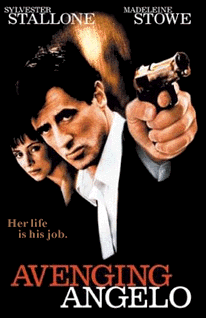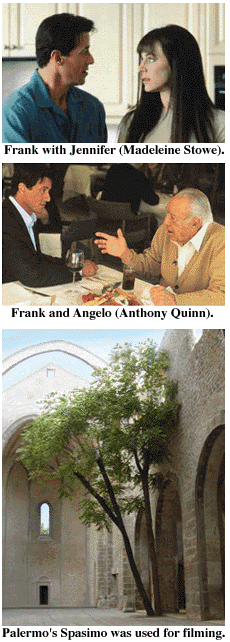...Best of Sicily presents... Best of Sicily Magazine. ... Dedicated to Sicilian art, culture, history, people, places and all things Sicilian. |
by Michele Parisi | ||
Magazine Index Best of Sicily Arts & Culture Fashion Food & Wine History & Society About Us Travel Faqs Contact Map of Sicily |
Directed by Martyn Burke, Avenging Angelo stars Sylvester Stallone, Madeleine Stowe, Raoul Bova and, in his last role, the late Anthony Quinn. The executive producer was actor/director Andrew Stevens. The musical score was written by Bill Conti, who has worked with Stallone since Rocky, and some nice classical pieces are used. Aged, Sicilian-born Mafia don Angelo Allieghieri, played by Anthony Quinn, is shot to death while his bodyguard, Frank Delano (Stallone), is supposed to be protecting him. Angelo, a widower, leaves behind a daughter, Jennifer (Stowe). Now a mother and wife living in suburban New York, Jennifer discovers that her husband is cheating on her and spends her free time getting drunk and reading the novels of a Sicilian novelist, Marcello (Raoul Bova), with whom she is infatuated. Jennifer learns that her real father was, in reality, the deceased Angelo, and not the man who, with his wife, had raised her. It happens that Jennifer's natural mother died giving birth to her in Sicily, and that Angelo placed her in the care of the Towers, a WASPish (white, Anglo-Saxon Protestant) couple, when she was just a few months old. Frank meets Jennifer to give her a DVD Angelo made for her before his death. He must now protect her from possible assassins seeking vendetta against her It turns out that Frank has been protecting Jennifer for most of her life, and is secretly in love with her, but he is reluctant to confess his true feelings for the woman whose life he must now defend full-time. A question of ethics, as it were. Shedding the figure of the bored trophy wife, Jennifer easily embraces her new-found identity as a Mafia princess, and gradually "Sicilianizes" herself, but a surprise awaits her in Sicily. Anthony Quinn was a legend in his own time. A slightly younger Madeleine Stowe has acted with him in the past (in 1990's Revenge) and in Avenging Angelo, at 44, she still looks pretty good. Her performance here is solid and actually quite convincing. Stallone is good as a "soft" mobster. Bova is well-known in Italy but his role as Marcello doesn't require much effort. The film's brief but important Sicilian footage, shot in Castellamare del Golfo and in an old church (the "Spasimo") in central Palermo, takes up less than fifteen minutes in a movie that is already short (94 minutes running time). Castellamare may have been chosen because of its association with the Mafia, but it's a delightful seaside town. A slightly longer movie might have offered a longer glimpse of Sicily and, more importantly, a better exploration of the rapport between Jennifer and Frank, which would have allowed for more complex characters. An interesting angle that might have been further developed is the theme of the American housewife who discovers her bizarre roots and must evolve into something which, on a cultural and emotional level, she is not. The transition from Jennifer Towers Barrett to Jennifer Allieghieri is one of the most intriguing aspects of the whole movie, and I would like to have seen more of it. The subtle counterpoise of Frank's sincere, direct Italian-American persona against Marcello's smoother but unsavory Italian one could have been explored in more of its details, making for an esoteric but interesting study in contrasts. Mafia movies --for better or worse-- are here to stay. Avenging Angelo is only marginally dramatic, though it offers fast action and some touching moments. It could be suggested that the film gives us mixed signals. The murder of Angelo (Quinn) is a scene we might expect in a more violent "Godfather" type of movie, or in the kind of action film that is never intended to convey any serious story or message. That's not to say that Avenging Angelo seeks to put forth any profound emotional message, as that clearly is not the case, but its strange juxtaposition of the poignant and the comical may leave some viewers a little unsettled, if not disappointed. They're not the kind of thing one usually expects from an action-based "romantic comedy." (For comparison, John Badham's 1990 Bird on a Wire, with Mel Gibson and Goldie Hawn, comes to mind.) While Sylvester Stallone gets top billing, the co-protagonist is the character played by Madeleine Stowe --a gifted but critically underrated actress whose performances in numerous screen roles over the years have been skillful and sometimes inspired. Stowe is a natural choice for the part of Jennifer. If this film doesn't quite make it, it's not for lack of good actors, who have to work with the dialogue they're given. Avenging Angelo was given an "R" rating in the United States, probably for its violence and an early sex scene of Jennifer's husband with another woman. It presents no more sex or violence than you would normally see in prime time television programming in the United States, Canada, Italy or elsewhere. While some of the scenes are nicely realized and even memorable (the funeral, the opera, Sicily), the film is not the sum of its parts --good acting, attractive location filming, competent direction and cinematography. This movie is good but not great. It almost works. But in some ways it is charmingly refreshing precisely because it doesn't take its subject too seriously. About the Author: Michele Parisi, who presently resides in Rome, has written for various magazines and newspapers in Italy, France and the United Kingdom. | |
Top of Page |
 The last decade or so has seen the emergence of a spate of
American
The last decade or so has seen the emergence of a spate of
American  deceased father.
deceased father.